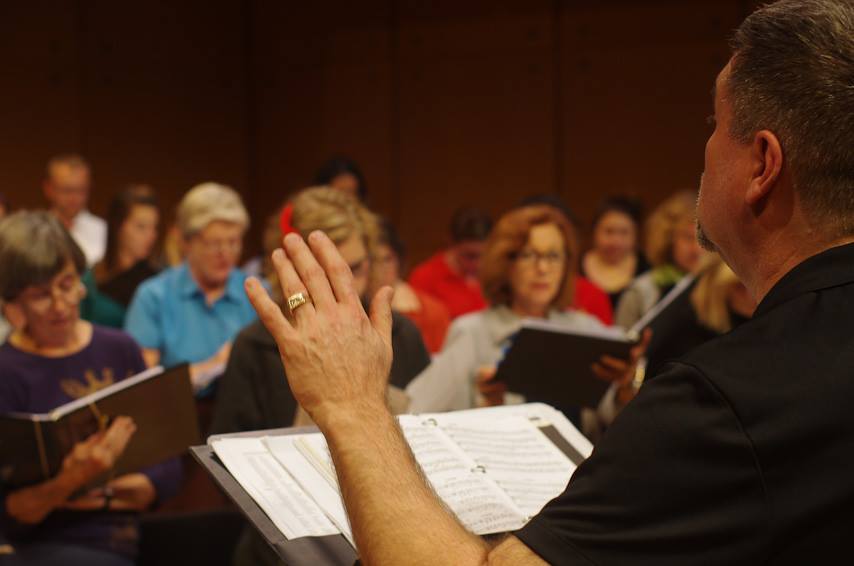Illinois State University’s Civic Chorale has a unique place among the vocal ensembles in the School of Music. Begun in the late 1960s, the group brings together generations of musical experience, from college freshmen to retirees.
This year’s Civic Chorale consists of around 80 members; a melodic balance of students and community members. The undergraduate and graduate students come from a variety of majors including music, as well as technology, and education. The community members, a number of whom have been in the ensemble for years, also come from a variety of backgrounds.
The choir is conducted by John Koch, an associate professor of voice in the School of Music, who began as the group’s 11th conductor in 2010. Patricia Foltz, a staff member in Illinois State’s Department of Psychology, has been the piano accompanist for more than 25 years.
 The Civic Chorale performs stand-alone concerts each semester and often participates in larger musical performances alongside other School of Music ensembles during the year. The singers have performed works from a wide variety of genres, including Handel’s Messiah and other oratorios and even shorter pieces written by Koch, an accomplished opera performer.
The Civic Chorale performs stand-alone concerts each semester and often participates in larger musical performances alongside other School of Music ensembles during the year. The singers have performed works from a wide variety of genres, including Handel’s Messiah and other oratorios and even shorter pieces written by Koch, an accomplished opera performer.
“In 2011, the group was part of a performance of Memorial, a work commemorating the victims of the 9/11 attacks,” said Koch. “The performance included Illinois State’s Wind Symphony, choirs, and soloists. It was a very powerful performance.”
Practice is currently underway on Benjamin Britten’s Ceremony of Carols, which will be performed on November 19, at First Methodist Church in Normal, and again on December 15, in the old courtroom at the McLean County Museum of History. The Civic Chorale will also be part of a larger performance of music by Edward Elgar produced by the School of Music this fall.
Civic Chorale members practice together for two hours a week during regular semesters. The limited practice time often presents a challenge for the director. “It’s a balance between finding music that will challenge the singers, but not be beyond their abilities, given our limited time,” he said. “That’s why a strong core of community members is such an asset to this group. We have about 25 longtime members who are lifelong singers. Their experience lends a great deal to the group.”
Two of those lifelong singers are Ed and Judy Hines, who have been Civic Chorale members since 1985. The Hines’ met in the Mendelssohn Choir, as part of the Pittsburgh Symphony. Ed sang in ensembles during his student and work years at Teachers College, Columbia University, and at SUNY-Albany. Ed and Judy joined the Civic Chorale when John Ferrell, a neighbor who was an Illinois State music professor and then-director of the Civic Chorale, knocked on their door when they moved in, asking if anyone in the household liked to sing.
Ed Hines is not only a dedicated singer in the Civic Chorale, he is also the ensemble’s official historian. During a voice lesson in 2014, Hines and Koch fell into a conversation and noted that no history of the group had ever been compiled. Hines, a Distinguished Professor Emeritus in the College of Education, interviewed former conductors and spent weeks poring through documents in the University Archives and School of Music Archives. The result was The Illinois State University Civic Chorale: A Proud Past and a Promising Future, copies of which are in the collection at Milner Library and the McLean County Museum of History.
Every major concert performed by the Civic Chorale was included in the history along with information about the works performed, the directors, and the soloists. In addition to those 92 concerts, Civic Chorale has performed regularly with other Illinois State choirs and with the Illinois Symphony and the Peoria Symphony.
Ed Hines agrees that the blended nature of the Civic Chorale is what makes it such a vibrant group. “The uniqueness of Civic Chorale is that mature community members are active singers alongside the students,” said Hines. “Their common bond is a love for choral singing and performing the major works, including oratorios and significant choral pieces that are accompanied by orchestra.”
Koch said he and the ensemble members are always looking for ways to further strengthen connections with the local community. “We’re always looking for unique musical opportunities and new places to perform in Bloomington-Normal,” he said. “New members are always welcome. This is a group of people that just loves to sing.”

